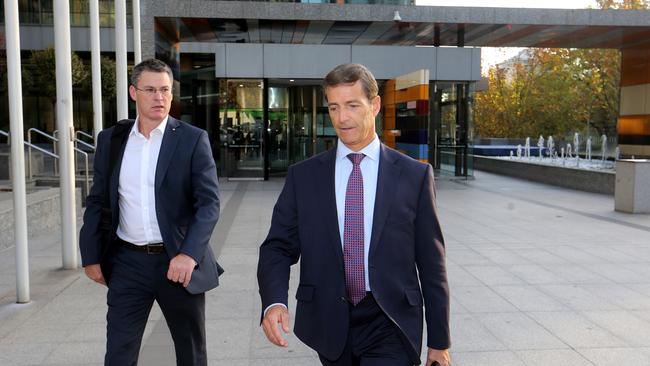Heavy human cost when CBA cleaned up Bankwest loan book
The shocking state of Bankwest’s loan book after CBA took it over in the depths of the financial crisis has been laid bare.

The shocking state of Bankwest’s loan book after CBA took it over in the depths of the financial crisis and the desperate measures Australia’s biggest bank took to clean it up have been laid bare in evidence to the financial services royal commission by the institution’s chief risk officer, David Cohen.
Mr Cohen was also confronted yesterday afternoon with the human cost of CBA’s purge of bad Bankwest loans, codenamed Project Magellan, when, as he sat in the public gallery waiting to give evidence, a borrower choked back tears as he struggled to describe the impact on his brother of the bank seizing the pub they owned together. Internal documents shown to the royal commission have revealed that in May 2009, eight months after CBA took over Bankwest, property lending made up more than half the Bankwest commercial loan book.
Bankwest’s impaired debts tripled from $129 million to $397m in just the 12 months from January 2008 to January 2009, a memo to its risk committee showed.
Over the same period, the value of specific provisions raised against the assets increased some 13 times from $11m to $139m, the memo showed.
Bankwest’s commercial property lending was so vast that by taking it over CBA blasted through a concentration limit of 10 per cent lending to any one industry before approval from the chief executive was required, and pushed it perilously close to a limit of 12.5 per cent before approval was needed from the group’s powerful executive risk committee, an update to the committee in September 2009 shows.
The committee was asked to “endorse the proposed introduction of exposure caps on … commercial property positions in the short term and the proposed reduction in Bankwest property exposures”.
Adding to the grim picture, Bankwest employees lacked expertise assessing loans.
Mr Cohen admitted CBA had a range of worries about the actions of Bankwest staff.
“The concern was that potentially the credit ratings used by Bankwest, when it was rating particular business loans, were perhaps not as diligently applied as Commonwealth Bank applied credit ratings,” Mr Cohen said.
“And secondly that the ongoing management — that is, the day-to-day management of a loan by the business relationship managers — was not as active, and the loan and the progress of the loan through its life cycle was not as actively monitored by the relationship managers as it should have been.”
When bank staff give a loan a risk rating it can affect whether the loan is considered to be impaired or troublesome. The risk rating can also affect the interest rate the bank charges.
CBA’s solution was Project Magellan — one of two bank projects dealing with Bankwest that was named after explorers into the unknown.
Over just five months from initial planning in February 2010, Project Magellan staff — brought together from inside the bank and seconded from insolvency firms — reviewed more than 60 per cent of Bankwest’s business loans, worth $21.6 billion, documents tendered to the commission show.
Earlier, Mr Cohen, seated in the second-last row of the public gallery, watched on as Bankwest customer Brendan Stanford broke down in the witness stand after being asked about the effect on his brother of the bank seizing a hotel they owned and selling it for a third of its purchase price.
Commissioner Kenneth Hayne was forced to call a short adjournment to give Mr Stanford time to regain his composure.
“From the time this was instigated I saw him struggle and even after it all happened I saw him depressed for a few years,” Mr Stanford said.
“That’s why I’m here today, because he couldn’t come in.” Mr Stanford and his brother bought the Coronation Hotel in Portland, west of the Blue Mountains, for $1.6m, of which they borrowed $1.2m.
Initially the hotel traded well but Mr Stanford said trading fell away in 2010 due to aftershocks from the global financial crisis and a smoking ban in pubs.
Bankwest asked an investigative accountant to review the hotel and did not show the report to Mr Stanford — but still asked him to pay the accountant’s fee of $9900, he said.
The bank said the hotel was only worth $250,000 but he pressed to find out how they could come up with that figure, he said.
“It was a high anxiety type thing,” Mr Stanford said. “It wasn’t a good feeling to be on someone else’s turf and be told that your business is worth $250,000 and we are not going to show you why.”
While being treated for leukaemia in 2012 he stepped away from involvement in the business.
The brothers tried to sell the pub in the lead-up to a June 2014 deadline. Despite a “paper “valuation” of $1.2m he was told the hotel was only worth in the $900,000s.
Even an offer from his brother’s partner to invest $400,000 did not sway the bank.
Receivers ultimately sold the hotel but Mr Stanford said he did not find out the price until much later, which he believed to be just $525,000.



To join the conversation, please log in. Don't have an account? Register
Join the conversation, you are commenting as Logout